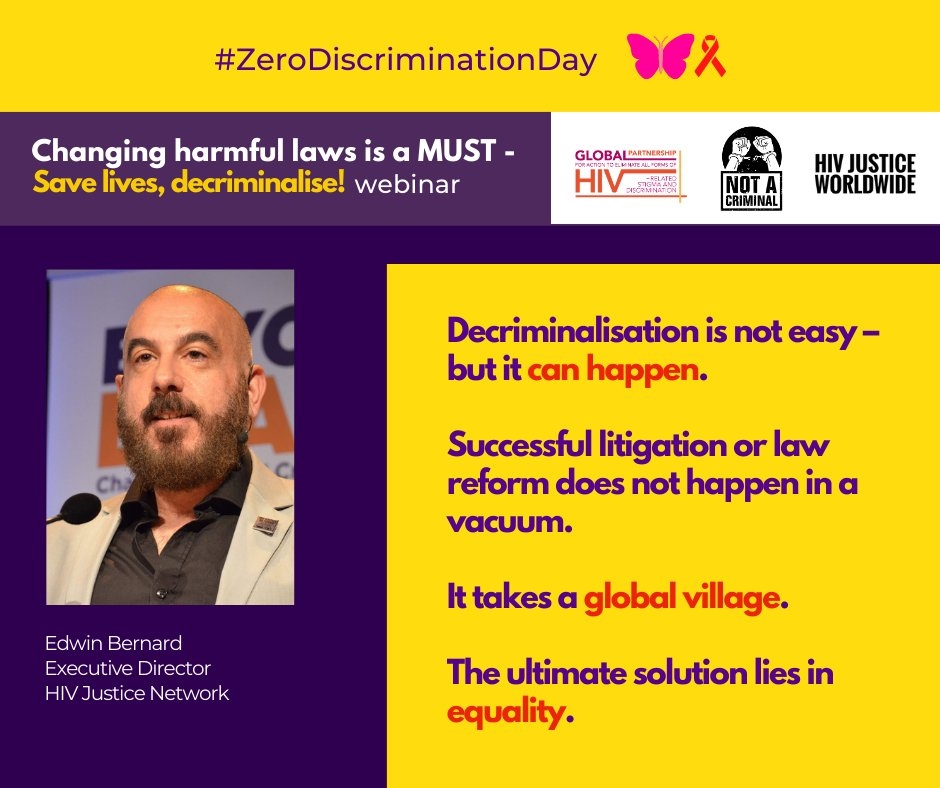1 March 2023
Edwin J Bernard
Today, on On Zero Discrimination Day, HJN was delighted to participate in a webinar — co-hosted with the Global Partnership to end HIV-related Stigma and Discrimination and the Not A Criminal Campaign — that explored how law reform is possible.
You can watch the entire webinar here: https://fb.watch/i-79fP5bYV/
I was asked to provide some closing remarks. As we were running late, I had to cut some of my prepared remarks, which are included here in square brackets [ ]. Here they are in full.
We all know decriminalisation is possible. But it’s not easy. Still, it can and does happen.
It can happen thanks to the strong commitment of the three most important pillars that make change possible:
-
It starts with community leadership
-
It ends with government commitment and political will
-
And it happens with the support of the broader UN family (co-ordinated by UNAIDS) working closely with partners like the Global Fund and PEPFAR.
This is why the
Global Partnership is the ideal mechanism to cement those three pillars together.
But what does it actually take to change laws? Successful strategic litigation or law reform doesn’t happen in a vacuum. That means not only funding the legal or human rights organisations challenging the laws, but also (a non-exhaustive list):
-
Funding the communities impacted by those laws, supporting people to know their rights;
-
Funding the community-based paralegals to help frightened and vulnerable people navigate the harsh realities of criminal legal system;
-
Funding community-based organisations to monitor rights violations, produce shadow reports, and document the evidence of the harms of criminalisation;
-
Funding community-led training and sensitisation of police, prosecutors and judges, and law-and policy-makers; and
-
Funding the community-based organisations supporting and co-ordinating the work regionally and globally, creating tools for challenge including working with the media where so much of the stigma created by these harmful laws is perpetuated, but can be also where hearts and minds can be changed.
So it takes a (global) village.
And time – which we don’t have much of if we are to reach those ambitious 10-10-10 targets by 2025, or 2030.
And money – which we never seem to have enough of.
But it is possible, and it can happen.
We’ve heard today about various forms of decriminalisation. And you all saw
the map that Tinashe shared earlier showing that HIV criminalisation laws have been reformed or repealed in 15 countries over the past decade, but there’s still another 129 countries to go!
And although we didn’t get to hear today from our colleagues working with
people who use drugs, and in
drug policy, over 30 countries around the world have adopted legal reforms to remove the criminalisation of certain activities related to drug use.
But we also heard about the many challenges that remain.
[This work is sometimes really hard and sometimes doesn’t always lead to success – at least the first time around. Despite the best efforts of our colleagues at KELIN and UGANET, we were disappointed to learn at the end of 2022 that constitutional challenges to Kenya’s and Uganda’s HIV-specific criminal laws were unsuccessful. Nevertheless, both will appeal these retrograde rulings, because they – and we – are on the right side of history. After all, Zimbabwe repealed their HIV-specific criminal law last year following years of advocacy following unsuccessful strategic litigation.
We know that HIV criminalisation mostly serves as a proxy for other kinds of discrimination – discrimination based on class, ethnicity, gender identity, migrant status, race, sex, sexual orientation, and other potential markers of social vulnerability.
And we know that most aggressive push to criminalise people living with HIV tends to occur at the intersection of several stigmatised or criminalised identities.
And so we firmly believe that this work must be intersectional and collaborative.]
We also know that decriminalisation alone will not address the full complexity of the intersecting stigmas behind these laws and their enforcement. As with other manifestations of discrimination, the ultimate solution lies in equality and empowerment. This is a marathon, not a sprint, and dismantling systems that have been built over decades and that oppress people living with HIV and key populations takes time.
We heard today from the South African Deputy Minister of Justice about the
Sex Work Decriminalisation Bill. We, and many others in our global network have written letters of support to the South African government welcoming this change. This Friday, 3rd March, is
International Sex Workers Rights Day. Let’s make sure South Africa knows the world is watching and that South African sex workers know we have their back.
HIV is not a crime, and sex work shouldn’t be a crime, either!
